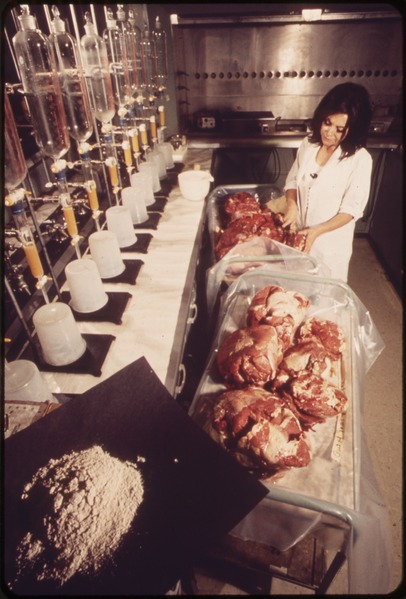I’m a vegetarian, and I think you know I believe children shouldn’t be admitted to fast-food restaurants any more than they are bars. But I don’t have any ethical objections to lab-grown meat. I wouldn’t eat it because it’s still meat which I think is still unhealthy, but I suppose if it were ultimately made in such way as to be healthy, I would probably have it. Why not? The opening of “The Vegan Carnivore?” Julian Baggini’s new Aeon essay:
“The chef Richard McGeown has faced bigger culinary challenges in his distinguished career than frying a meat patty in a little sunflower oil and butter. But this time the eyes and cameras of hundreds of journalists in the room were fixed on the 5oz (140g) pink disc sizzling in his pan, one that had been five years and €250,000 in the making. This was the world’s first proper portion of cultured meat, a beef burger created by Mark Post, professor of physiology, and his team at Maastricht University in the Netherlands.
Post (which rhymes with ‘lost,’ not ‘ghost’) has been working on in vitro meat (IVM) since 2009. On 5 August this year he presented his cultured beef burger to the world as a ‘proof of concept’. Having shown that the technology works, Post believes that in a decade or so we could see commercial production of meat that has been grown in a lab rather than reared and slaughtered. The comforting illusion that supermarket trays of plastic-wrapped steaks are not pieces of dead animal might become a discomforting reality.
The IVM technique starts with a harmless procedure to remove myosatellite cells — stem cells that can only become muscle cells — from a live cow’s shoulder. They are then placed in a nutrient solution to create muscle tissue, which in turn forms tiny muscle fibres. Post’s burger contained 40 billion such cells, arranged in 20,000 muscle fibres. Add a few breadcrumbs and egg powder as binders, plus some beetroot juice and saffron to give it a redder colour, and you have your burger. I was at the suitably theatrical setting of the Riverside Studios in west London to see the synthetic burger unveiled. The TV presenter Nina Hossain was hired to provide a dose of professionalism and glamour to what was in effect a live TV show, filmed by a substantial crew for instantaneous webcast.
When the lights dimmed, images of gulls flying over gentle sea waves were projected onto two screens by the sides of the stage. Over some sparse, slow, rising guitar chords, Sergey Brin, the co-founder of Google and a donor of €700,000 to Post’s research, uttered the portentous words: ‘Sometimes a new technology comes along and it has the capability to transform how we view our world.’ He was right. Never before has a human eaten meat without harming or killing an animal. But in a strange way the slick presentation detracted from the truly historic nature of the moment. A scientific landmark was sold to us in the manner of a glitzy product launch, a piece of corporate puff.
What was most striking to me was how the presentation led, not with science, but with ethics.”

